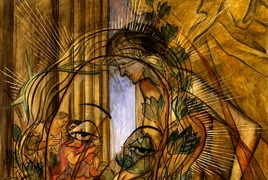MoMA announces comprehensive retrospective of Francis Picabia February 20, 2016 - 16:22 AMT PanARMENIAN.Net - The Museum of Modern Art announces Francis Picabia: Our Heads Are Round so Our Thoughts Can Change Direction, the first major exhibition in the U.S. to encompass the full range of Picabia's audacious, provocative, and profoundly influential career, on view November 20, 2016–March 19, 2017, Art Daily reports. MoMA's first-ever monographic exhibition of the artist, Francis Picabia brings together some 200 works in multiple mediums to explore the artist's critical place in the history of 20th-century art. Francis Picabia is organized by MoMA and the Kunsthaus Zürich. The curators are Anne Umland, The Blanchette Hooker Rockefeller Curator of Painting and Sculpture at MoMA; and Cathérine Hug, Curator at the Kunsthaus Zürich; with Talia Kwartler, Curatorial Assistant, MoMA. Prior to its presentation in New York, the exhibition will be shown in Zurich at the Kunsthaus Zürich from June 3 to September 25, 2016. Among the great modern artists, Francis Picabia (French, 1879–1953) remains one of the most elusive; he vigorously avoided any one singular style or medium, and his work encompassed painting, performance, poetry, publishing, and film. Though he is best known as one of the leaders of the Dada movement, his career ranged widely—and wildly—from Impressionism to radical abstraction, from Dadaist provocation to pseudo-classicism, and from photo-based realism to art informel. Picabia's contributions to a diverse range of artistic mediums, along with his consistent inconsistencies, make him especially relevant for contemporary artists, and his career as a whole challenges familiar narratives of modernism. Francis Picabia—conceived in partnership with the Kunsthaus Zürich, where its presentation is scheduled to coincide with the 100th anniversary of the founding of the Cabaret Voltaire, in 1916—assembles key selections and bodies of work, ranging in date from the first decade of the 20th century through the early 1950s. Picabia's work as a painter—albeit one whose oeuvre consistently contests the term—will be represented, along with his activities as a publisher and contributor to vanguard journals, and his forays into screenwriting and theater. The core of the exhibition comprises some 125 paintings, along with approximately 45 key works on paper, one film, and a carefully chosen selection of printed matter. Among the works and significant groups of works included in the exhibition are a selection of the Impressionist paintings that first established Picabia as a successful artist in Paris; monumental abstract canvases, several of which were included in the Armory Show in 1913 and introduced Picabia’s work to New York for the first time; quasi‐erotic, mechanomorphic paintings ranging from Je revois en souvenir ma chère Udnie (I See Again in Memory My Dear Udnie) (1914) to L’Enfant carburateur (The Child Carburator) (1919); iconoclastic Dada “masterpieces” such as Tableau Rastadada (Rastadada Painting) (1920) and L’Oeil Cacodylate (The Cacodylic Eye) (1921); a group of figurative, stereotypical Spanish women (Espagnoles) and mechanical abstractions, such as those shown at Picabia’s Galeries Dalmau exhibition in Barcelona in 1922; collage and “monster” paintings of the mid‐1920s; “transparencies” from circa 1927 to 1933; a diverse selection of portraits, abstractions, and figure paintings from the late 1930s; and a number of his controversial “pin‐up nudes” from circa 1940–43, appropriated from trashy pulp fiction and magazine illustrations. The exhibition will conclude with Picabia’s post‐WWII abstractions, including a group of encrusted, thickly repainted monochromatic “point” or “dot” paintings, some with titles derived from Friedrich Nietzsche; and several enigmatic late works created after the artist suffered a debilitating stroke in 1951. Photo: 2016 Artists Rights Society (ARS), New York/ADAGP, Paris. The creative crew of the Public TV had chosen 13-year-old Malena as a participant of this year's contest. She called on others to also suspend their accounts over the companies’ failure to tackle hate speech. Penderecki was known for his film scores, including for William Friedkin’s “The Exorcist”, Stanley Kubrick’s “The Shining”. The festival made the news public on March 19, saying that “several options are considered in order to preserve its running” Partner news |